September 11 Terrorist Attacks, 2001
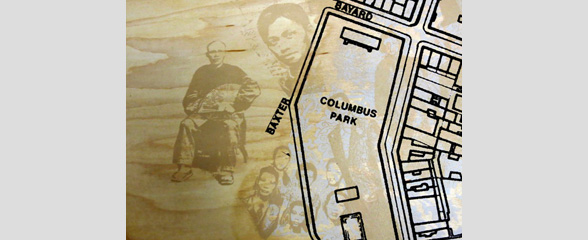
2008.040.011 Oral History Interview with Howard Pyle January, 15 2008
Howard Pyle talks to MOCA about his experiences moving into the broader Chinatown area during the booming dot-com years of the 1990s and how he has witnessed things change since then. He offers listeners some interesting context for the rise and fall of the dot-com bubble and how 9/11 affected many parts of lower Manhattan and led to shifts in population. Howard also goes into detail about the punk scene in DC where he was from and how he felt when he first moved to NYC and was forced to learn the cultural geography. He shares his experience with the Yellow Arrow Project as well as his thoughts on what connects people to the spaces they visit or inhabit. The conversation concludes with Howards thoughts on the term gentrification and the real-world impacts of gentrification on NYC and the artists who live there.
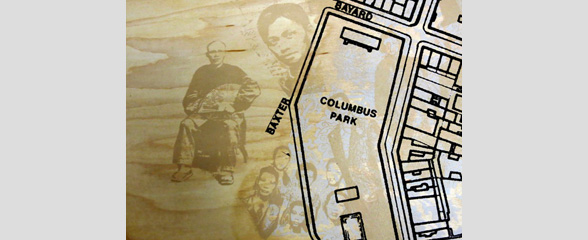
2008.040.013 Oral History Interview with Larry Goodman December 16, 2007
Larry Goodman, todays owner of his familys corporation Grand Machinery Exchange, Inc., recounts how his first generation Polish grandfather founded the company in 1927. Goodmans father Jerry and uncle Isidore took control of the business in 1947, and Larry Goodman later succeeded his father in 1983. According to Goodman, Centre Street machinery dealers were predominantly Jewish and were often afraid of non-Jewish “outsiders.†These business men were concerned with gaining respect and carried physical and psychological hardships because of this work ethic. Goodman also recalls the mixture of unity and intense competition between Jewish and Italian machinery dealers, the whole of which was referred to as the “forty thieves,†since most of the dealers were considered unrefined and were occasionally accused of having questionable business ethics.
Goodman reminisces about Chinatown as the industrial center of Manhattan, where he saw gradual sociological changes between the 1950s and 2000, including industry, hardware, and supporting retail spaces systematically leaving the area. Goodman sold the Grand Machinery Exchange shop building in 2005, explaining that business was no longer viable on Centre Street. He also notes the growing presence of Chinese-owned businesses on Centre Street, incorporating the neighborhood as a part of Chinatown rather than SoHo. Goodman reflects on how Centre Street has cycled through machinery and manufacturing, the garment industry, living-working spaces for creatives, and now finally to expensive developments. Furthermore, when asked to imagine the future of Chinatown, Goodman argues that money will dictate the outcome as part of a natural economic cycle. In his eyes, wealthy populations will move into the area, demand more luxury services and support and retail to accommodate their lifestyle and living spaces, and replace “mom and pop†establishments that can no longer afford to remain there.
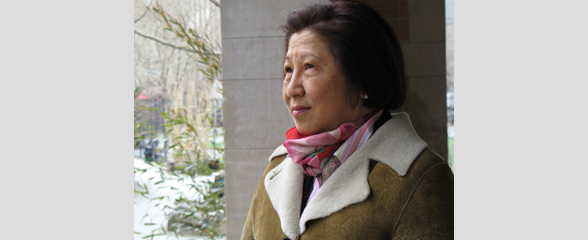
2008.040.022 Oral History Interview with Spring Wang September 8, 2008
Spring Wang is an independent developer who was born in China and raised in Taiwan. In this oral history, she discusses her experience of moving to the United States in 1968, where she attended college and became a Marxist heavily involved in political and social movements. One organization with which she associates herself is Asian Americans for Equality (AAFE), a group devoted to talking about social services, equal employment opportunities, and housing development. She reflects on her experience in New York’s Chinatown, paying particular attention to the infrastructure and ongoing development that trickles into Soho, the Lower East Side, and Tribeca.
Events like September 11th and the global economic crisis come into play when Wang analyzes the demographic shifts in the community. According to Wang, new Chinese immigrants are more self-confident and forward-looking in contrast to earlier immigrants. She believes that because Chinatown is a small area, the institutions or physical aspect of the neighborhood is more essential than the residential population to the survival of Chinatown. She proposes that Chinatown builds larger institutions, advocating for the creation of places with more cultural spirit and symbolic significance to act as a “magnet†for the people.
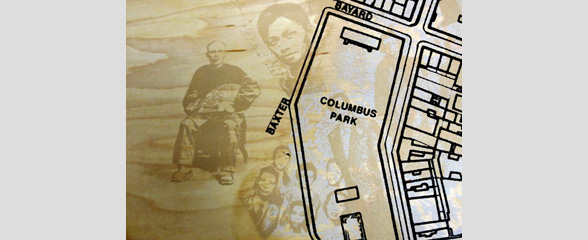
2008.040.023 Oral History Interview with Toby Turkel March 28, 2008
Toby Turkel is a Jewish woman who was born and raised in East New York, Brooklyn, and moved to Chinatown in the mid-seventies. She is an active community member, serving as the president of Chatham Towers, a co-op in Chinatown, as well as the vice president of Synagogue for the Arts. During this oral history, she begins by discussing her childhood in East New York and her personal journey that led her to live independently on the Lower East Side beginning in the sixties. Turkel later got married and moved into Chatham Towers, an apartment building located in Chinatown and predominantly inhabited by Asians. She explains how her relationship with the Chinatown community has grown over time and how she feels privileged to experience its unique culture, affectionately describing the area as “gritty†and down to earth. She also reflects on her unusual circumstance of being a non-Chinese resident of the neighborhood.
Turkel goes on to describe some of the issues affecting the Chinatown neighborhood that arise during the Chatham Tower board meetings, such as placard parking, congestion pricing, the proposed reconfiguration of Chatham Square, and the “Chinatown arch.†She also discusses the pros and cons of a proposed Chinatown Business Improvement District [BID], which would assess businesses and buildings and collect funds from landlords for community improvement. Although she recognizes there are some positive outcomes of gentrification, Turkel rejects changes that would threaten the fundamental character and distinctness of the Chinatown neighborhood.
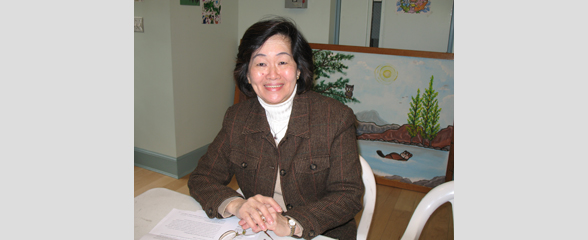
2008.040.025 Oral History Interview with Connie Ling February 12, 2008
Connie Ling, born in the Philippines and later a resident of Hong Kong during the 1960s, summarizes her experiences emigrating with her husband from Hong Kong to New York in 1967. Ling initially lived and worked in Chinatown, where she found employment as a machine operator in a garment factory. During her ten years working for the garment industry, Ling recalls an influx of Chinese immigrants and substantial growth in industrial businesses. After serving as a factory chairwoman for several years, she was eventually recruited as a union representative for UNITE in 1982, speaking for workers rights and mediating conflicts between workers and employers. At the time of her interview, Ling estimated that there were only approximately 100 union garment factories left. She attributes this decrease to the aftermath of September 11th, which caused commercial rent to double and garment industries to outsource labor to Sri Lanka, Mexico, and China. Ling also talks about the gentrification in Chinatown, stating that new condominiums are replacing old shops and factories while rent inflation is forcing old residents to move out of Chinatown. She goes on to note the growth among the Fukienese and Puerto Rican immigrant populations in the Lower East Side and expresses discontent with the growing number of Caucasian residents in Chinatown. Ling concludes by reflecting on how Chinatown’s garment industry is not likely to return due to significant changes in manufacturing and rent.
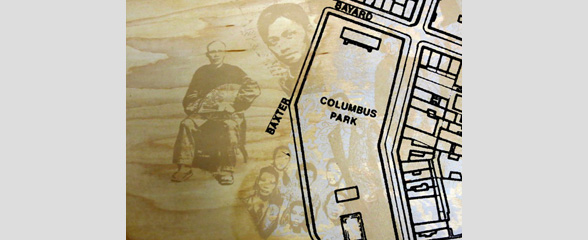
2008.040.026 Oral History Interview with Lana Cheung February 25, 2008
Lana Cheung emigrated with her husband from Hong Kong to the United States in 1987. Shortly after her arrival to New York, she remembers being initially surprised by the differences between Chinatown and Hong Kong, particularly in the contrasting architecture and combined residential and commercial areas. Cheung considers Chinatown a safe harbor for Chinese immigrants, where they had a sense of security and could speak their native language.
Cheung was employed by a Jewish import company, and later as a union agent for the garment workers union, UNITE (which had a Chinatown office starting in 1998). As a union representative, Cheung provides an insider perspective of the garment factory working conditions, which affected mostly Chinese immigrant women who endured long hours, hard labor, and the burden of sustaining their families. She notes that the garment factories also functioned as a place for women to communicate and socialize with each other, a detail that is often overlooked in historical accounts of garment factory working conditions.
Following September 11th, however, the garment industry slowed down and many of the garment factories were replaced by condominiums. While Cheung hopes that at least one garment facility will be preserved in memory of Chinatown’s industrial history, she otherwise welcomes the new developments and hopes that the younger and energetic generations will be a positive and reviving influence on community. Along these same lines, she acknowledges some current positive changes in sanitation, tourism, and efforts to ensure that Chinese culture and language are preserved in succeeding generations.
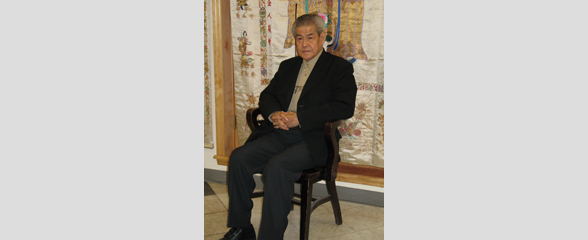
2008.040.027 Oral History Interview with Sing Kong Wong February 8, 2008
After being petitioned by his wifes family, Sing Kong Wong, a former administrator for a government agency in China, immigrated to New York in 1980 where he worked as a presser in a garment factory. Wong illustrates the poor working conditions in the garment factories, commenting on the lack of sanitation, violations of workers rights, and inadequate benefits and welfare. He explains how the steady decline in the garment industry has been especially problematic for immigrant populations, as they are unable to find other jobs and have limited financial means to pay the rising rent. Wong believes that the decline in garment factories began with the U.S. legislation that permitted jobs to be outsourced to Mexico, China, and India. After the events of September 11th, the situation worsened as landlords demanded higher rent and as zoning changed residential areas to commercial and business spaces.
Wong mentions that as a way to remember his past life and to share important life lessons with future generations, he has photographed personal and historically significant subjects and occurrences relevant to his life and experiences. Such subjects include the harsh conditions in garment factories, life in Chinatown, and the events of September 11th. He continues to describe the changes in Chinatown occurring over the past thirty years, like the improving tolerance and relationships between ethnic and provincial groups and the greater appreciation for Chinese culture and traditions.
Finally, Wong elaborates on his views regarding gentrification, worrying that people with lower-incomes will suffer the consequences of uncontrolled rent prices, eviction, real estate development, and a poor job market. He suggests that the government should be more involved in maintaining the parks, providing more recreational programs for the community, and fixing local traffic problems. Wong asserts that progressive and proportionate improvements are necessary, but these improvements must serve all residents and not just the wealthy.
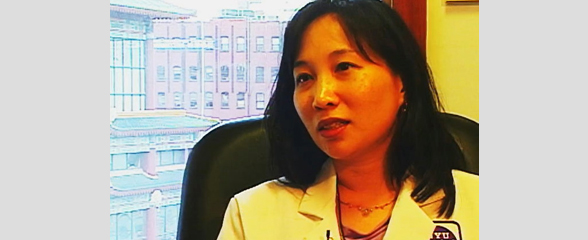
2014.036.001 Oral History Interview with Blanche Leung June 16, 2004
Blanche Leung, M.D., was born on April 16, 1970 in Queens, New York to immigrant parents from Hong Kong and Canton, China. She sits down to recount the immigration story of her parents, from when they left China as young children following the Communist changeover to their time in Hong Kong, Taiwan, Canada and the United States, where they ultimately settled in 1969. Her father was a pharmacist and her mother was a hematology lab manager. She talks extensively about the family pharmacy located on Lafayette and Walker Streets, which served as a focal point for the family. Blanche and her mother frequently went to assist at the pharmacy in addition to spending time in the Chinatown area for errands and extracurricular activities such as ping pong and Chinese School even though they lived in Elmhurst, Queens.
Her childhood relationship with the Chinatown community and the New York Chinese community evolved when she became a medical professional and served as a liaison between Chinese patients and other hospital staff to improve the quality of care. She would later open a practice in Chinatown and describes the interactions she has with her Chinese patients. The interview conversation transitions from talking about Chinese-speaking patients and Chinese language medical resources to her experiences during and after the 9/11 attack. Blanche describes the emotional and physical impact on Chinatown following the terrorist attack in the context of her patient care, diagnosis, and medical requests in addition to the change in the street scene in the aftermath. She concludes the interview with answers to questions regarding Chinatown rebounding from 9/11 and her intentions to continue her medical practice in Chinatown amidst the ever-changing demographics and geography of Chinatown.
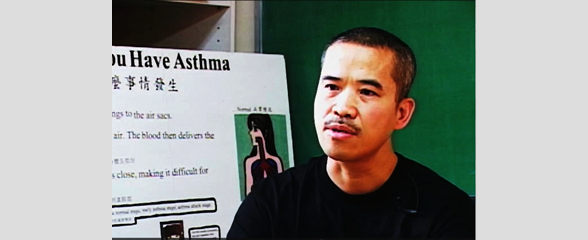
2014.036.003 Oral History Interview with Chris Chan May 24, 2004
Chris Chan is a Chinese immigrant who works for the Chinese Progressive Association (CPA). Born in China, Chris moved to Macau at two years of age following the Communist takeover of China. During his young adult years, he worked as a construction laborer in Hong Kong during the 1970s and 80s construction boom before being sponsored by his sister to immigrate to the United States in 1984. Chris describes the various construction and labor jobs he took on in the early years, the differences between New York City, Chinatown, and Hong Kong, and the challenges he faced as he tried to learn the English language. Chris would become active at the CPA in 1989 and would work for them as an employee in 1992. Chris elaborates on his work at the CPA, emphasizing its services to the local community, including but not limited to immigration rights, citizenship exam and procedure guidance, English classes, local environmental issues, and improving overall community health. In 2002, Chris and the CPA surveyed 580 people in the Chinatown area to study the effects of pollution on the local community and its correlation to asthma symptoms. He states that the CPA attempts to raise awareness of air pollution and dispel misconceptions of asthma in the Chinese community living in Chinatown through an emphasis on educating the population using their study. Chris notes that the 9/11 attack compounded the air quality issues but there are many pre-existing factors that needed addressing to improve quality of life. The discussion following his description of the CPA survey includes their plans to utilize the survey data to continue to educate the populace and to convince other organizations to assist in improving air quality in the Chinatown area.
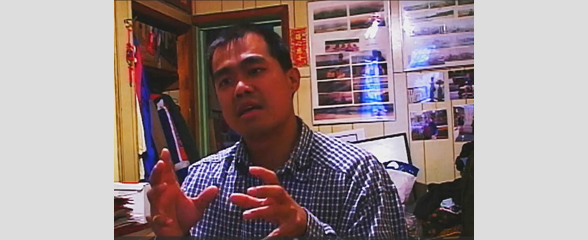
2014.036.004 Oral History Interview with Jami Gong April 26, 2004
Jami (Jameson) Gong is a Chinese American comedian and local Chinatown resident. Born August 23, 1969 in New York City, Jami is the son of immigrant parents from Hong Kong and Southern China. His parents immigrated to the United States in 1967 with a desire for better opportunities and a better life for their children. He reminisces about his time growing up and living in Chinatown, the pollution problem, the changing demographics over time, and the education he and his siblings received. Jami continues on to talk about his time at Syracuse University and his eye opening experience as a college student meeting people from all over the world and being more independent living outside of Chinatown. Jami describes his early experiences doing standup during his time at Syracuse University and how it made him realize that comedy was a career path for him to consider. Jami would continue to do comedy on-and-off while working jobs in New York City until he came to a realization that he could do comedy in Chinatown as a way to revitalize the local economy and nightlife following the 9/11 attacks. The success of TakeOut Comedy and his Chinatown tours would be far reaching, with media coverage from international news groups giving Chinatown recognition as a result of his efforts. Jami also describes his own 9/11 experience of witnessing the towers fall and capturing photos and videos of that particular day. Following the attacks, he noted the negative impact it had on the Chinatown economy and worked to bring back tourism into the Chinatown NYC area through his work as a local tour guide and TakeOut Comedy events. His involvement in Chinatown led him to civil rights activism, leading the local OCA chapter to advocate for equal rights for Chinese Americans. He concludes the interview with his dreams of uniting the world through comedy and what he hopes to achieve in the near future.